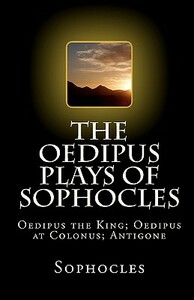You need to sign in or sign up before continuing.
Take a photo of a barcode or cover
547 reviews for:
The Oedipus Plays of Sophocles: Oedipus the King; Oedipus at Colonus; Antigone
Sophocles
547 reviews for:
The Oedipus Plays of Sophocles: Oedipus the King; Oedipus at Colonus; Antigone
Sophocles
mysterious
reflective
tense
medium-paced
Plot or Character Driven:
Character
Strong character development:
N/A
Loveable characters:
Complicated
Diverse cast of characters:
N/A
Flaws of characters a main focus:
Yes
challenging
reflective
medium-paced
dark
emotional
sad
medium-paced
Plot or Character Driven:
Plot
Flaws of characters a main focus:
Yes
First time reading Oedipus the King and absolutely LOVED it - the tragedy!! The drama!! Had read Antigone before but a different translation so it was enjoyable to try a different one and compare from memory. She's such an intriguing figure! Oedipus at Colonus was the weakest of the three for me but I did enjoy it - I feel like it screams Athenian propaganda though?? The journey Creon goes on in this too - unfairly accused by Oedipus in Oedipus the King to becoming positively villainous in Oedipus in Colonus, then having his own tragic downfall in Antigone... truly, everyone is having an awful time.
dark
mysterious
medium-paced
Plot or Character Driven:
Character
Strong character development:
No
Loveable characters:
No
Diverse cast of characters:
No
Flaws of characters a main focus:
Yes
dark
emotional
sad
fast-paced
adventurous
challenging
dark
emotional
reflective
sad
tense
fast-paced
Plot or Character Driven:
Character
Strong character development:
Complicated
Loveable characters:
Complicated
Diverse cast of characters:
Yes
Flaws of characters a main focus:
Yes
dark
funny
mysterious
tense
medium-paced
Plot or Character Driven:
Character
Strong character development:
Yes
Loveable characters:
No
Diverse cast of characters:
Complicated
Flaws of characters a main focus:
Yes
- read Oedipus for school
- coursework essay topic: "How is Jocasta’s death presented so vividly in lines 1351-1421?"
- moral of the story: actively attempting to change one's "fate" only sets it in stone
- incestual (Oedipus x Jocasta)- not sure why it was necessary though
Read Oedipus for one of my modules.
A play that looks at the limits of Hellenic knowledge - Oedipus who was on a quest for knowledge, but was horrified at the truth of himself and blinded himself so he would never see his shame anymore. The play inverts the usual idea of knowledge=light, ignorance=dark; Oedipus' self-blinding puts him forever in the dark, and seems a mark of having attained full self-knowledge (e.g., Tiresias the blind prophet who sees all). There's also the idea of sight passing on knowledge - he blinds himself so he can't pass on the shame of his truth; others want to see him, but can't bear to look at him for fear that his knowledge is 'contagious', in a sense.
The play is centuries old, but the dreadful tension and intensity that escalates and escalates to a fever pitch till the truth is revealed is as compelling as if it were a modern play. Really liked this play.
A play that looks at the limits of Hellenic knowledge - Oedipus who was on a quest for knowledge, but was horrified at the truth of himself and blinded himself so he would never see his shame anymore. The play inverts the usual idea of knowledge=light, ignorance=dark; Oedipus' self-blinding puts him forever in the dark, and seems a mark of having attained full self-knowledge (e.g., Tiresias the blind prophet who sees all). There's also the idea of sight passing on knowledge - he blinds himself so he can't pass on the shame of his truth; others want to see him, but can't bear to look at him for fear that his knowledge is 'contagious', in a sense.
The play is centuries old, but the dreadful tension and intensity that escalates and escalates to a fever pitch till the truth is revealed is as compelling as if it were a modern play. Really liked this play.
dark
mysterious
reflective
sad
tense
fast-paced
Plot or Character Driven:
Character
Strong character development:
Yes
Loveable characters:
Complicated
Diverse cast of characters:
N/A
Flaws of characters a main focus:
Yes
The Three Theban Plays are three of the seven surviving plays written by Sophocles, which represent the pinnacle of the ancient Greek theatre. In this comprehensive addition by Penguin Classics— paired with essays, a family tree, list of terms, and an extensive bibliography — the three plays are presented in order of their appearance: Antigone, Oedipus the King (Oedipus Rex), and Oedipus at Colonus. The chronological order has Antigone last, as it concludes the story of the family of Oedipus, one of the most prominent figures in all of Greek myth.
Antigone is about the titular daughter of the now-deceased Oedipus, who buries the forsaken body of her traitorous brother against the will of her uncle, Creon, King of Thebes. It is a tale of stubbornness: Antigone is unflinching in her pursuit to provide her brother a proper burial, despite his faults and the punishment of death; Creon, meanwhile, will not budge from his notion that his nephew should not be buried, even though it is a sin against the gods. Her stubbornness costs herself her life and his own costs him his son and wife. Neither are particularly heroic, but in this Greek tragedy, it is the dead who smile at the living.
Oedipus the King is about the titular King of Thebes who, in his haughtiness and mental blindness, discovers that two intertwining prophecies have come true, which said that Oedipus will slaughter his father and share a bed with his mother. It is the ultimate sacrilege against one’s parents, and Oedipus plucks his eyes out in his agony. However, he really was mostly innocent in this dreadful affair: he had killed a man that attempted to kill him, that happened to be his father; he married a woman who agreed to marry him, that happened to be his mother. The play is deliriously ironic, as Oedipus believes that he has avoided the prophecy by fleeing his parents (who are really only his foster parents) and sits on the lofty throne of knowledge and power. However, he truly is blind, as he did not even know who his parents were until the prophecy had already been fulfilled. That is why he blinds himself once he learns of his bitter deeds, in addition to taking accountability for his mocking of a blind prophet earlier in the play. It is the cruelest of punishments for poor Oedipus, who experiences the oftentimes unfair nature of fate — purely inescapable fate.
Oedipus at Colonus continues the story of Oedipus, who has left the throne of Thebes and wanders Greece with the assistance of his daughter Antigone. He arrives in Athens and finds favor in the eyes of the king, Theseus, who vows to protect the body of the withering cripple even after death. Oedipus is no longer the confident king of years prior, but a broken, remorseful, angry man who pleads innocence in his past transgressions. It is a bitter conclusion, as Oedipus dies, his sons are destined to destroy each other, tyrannical Creon secures the throne, and his daughters’ fates are far from secure. On its own the play is unremarkable — although the writing of Sophocles is still remarkable — but it works tremendously as the middle entry in this spaced-out saga. The suffering of Oedipus serves the purpose of protecting a worthy city and Antigone will continue the stubborn heroism of her father in spite of adversity. The lives of these characters can be agonizing, but it is belief in a better outcome that shapes their world. Written for a Greek audience that had seen better days, the play is then an ode to the triumphs of old, while providing a nudge into the uncertain future.
Antigone is about the titular daughter of the now-deceased Oedipus, who buries the forsaken body of her traitorous brother against the will of her uncle, Creon, King of Thebes. It is a tale of stubbornness: Antigone is unflinching in her pursuit to provide her brother a proper burial, despite his faults and the punishment of death; Creon, meanwhile, will not budge from his notion that his nephew should not be buried, even though it is a sin against the gods. Her stubbornness costs herself her life and his own costs him his son and wife. Neither are particularly heroic, but in this Greek tragedy, it is the dead who smile at the living.
Oedipus the King is about the titular King of Thebes who, in his haughtiness and mental blindness, discovers that two intertwining prophecies have come true, which said that Oedipus will slaughter his father and share a bed with his mother. It is the ultimate sacrilege against one’s parents, and Oedipus plucks his eyes out in his agony. However, he really was mostly innocent in this dreadful affair: he had killed a man that attempted to kill him, that happened to be his father; he married a woman who agreed to marry him, that happened to be his mother. The play is deliriously ironic, as Oedipus believes that he has avoided the prophecy by fleeing his parents (who are really only his foster parents) and sits on the lofty throne of knowledge and power. However, he truly is blind, as he did not even know who his parents were until the prophecy had already been fulfilled. That is why he blinds himself once he learns of his bitter deeds, in addition to taking accountability for his mocking of a blind prophet earlier in the play. It is the cruelest of punishments for poor Oedipus, who experiences the oftentimes unfair nature of fate — purely inescapable fate.
Oedipus at Colonus continues the story of Oedipus, who has left the throne of Thebes and wanders Greece with the assistance of his daughter Antigone. He arrives in Athens and finds favor in the eyes of the king, Theseus, who vows to protect the body of the withering cripple even after death. Oedipus is no longer the confident king of years prior, but a broken, remorseful, angry man who pleads innocence in his past transgressions. It is a bitter conclusion, as Oedipus dies, his sons are destined to destroy each other, tyrannical Creon secures the throne, and his daughters’ fates are far from secure. On its own the play is unremarkable — although the writing of Sophocles is still remarkable — but it works tremendously as the middle entry in this spaced-out saga. The suffering of Oedipus serves the purpose of protecting a worthy city and Antigone will continue the stubborn heroism of her father in spite of adversity. The lives of these characters can be agonizing, but it is belief in a better outcome that shapes their world. Written for a Greek audience that had seen better days, the play is then an ode to the triumphs of old, while providing a nudge into the uncertain future.






